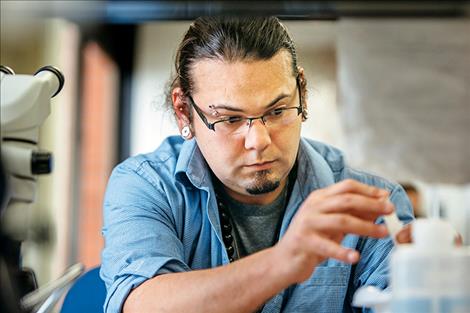MSU graduate student receives NSF fellowship
Hey savvy news reader! Thanks for choosing local.
You are now reading
3 of 3 free articles.
News from Montana State University
BOZEMAN – A Montana State University graduate student researching the ecological past of Montana’s Flathead Reservation has been awarded a prestigious National Science Foundation Graduate Research Fellowship to support his work.
Matthew Weingart, a first-year graduate student in MSU’s Department of Earth Sciences in the College of Letters and Science from Pablo, received the fellowship, which will pay his tuition and provide him with an annual stipend of $34,000 for the next three years.
Weingart, who is a Klamath tribal member and descendant of the Confederated Salish and Kootenai Tribes, earned his undergraduate degrees in hydrology and forestry with a minor in mathematical sciences from Salish Kootenai College on the Flathead Reservation.
He was one of four MSU students who participated in an MSU Graduate School workshop designed to help Native American students navigate the award’s application process, and he is the first participant to receive this fellowship. This is the second year of the workshop, which was funded through the MSU Office of the Provost as part of an American Indian recruitment and retention initiative.
Karlene Hoo, dean of MSU’s Graduate School, said the workshop and other mentoring and community activities for Native American graduate students contribute greatly to the students’ success.
Native students who have the potential for exceptional research are less likely than non-Native students to pursue awards or fellowships without encouragement and support, said Barbara Komlos, who works with Native American graduate students as program manager of the Graduate School’s Sloan Indigenous Graduate Partnership.
“The mentoring activities that we provide enable students such as Matt to achieve his research goals, but also an achievement such as this can serve as an inspiration to other Native students interested in pursuing a graduate degree in the sciences,” Komlos said.
Weingart does research in the Paleoecology Lab of Cathy Whitlock and Dave McWethy, both professors in the Department of Earth Sciences. Whitlock, director of the MSU Institute on Ecosystems, or IoE, worked with Weingart when he was an undergraduate IoE intern investigating past changes at Swan Lake, a site in Yellowstone National Park.
For his master’s research, Weingart is investigating how indigenous people influenced forested ecosystems on the Flathead Reservation and how landscape management enhanced or overrode natural climate variability in shaping patterns of fire and vegetation.
“This is a region with little research having been done on it, and knowing these past interactions can provide important information to the tribes,” Weingart said. “The area is unique because it’s a topographically diverse mixed-forest habitat that has been occupied by humans for at least the last 10,000 years.”
Weingart is reconstructing the environmental history of the region by examining the pollen and charcoal preserved in Rainbow Lake sediment cores to learn what role humans, fire and climate had in shaping the present vegetation communities.
“We use lake sediments to infer past environmental conditions, vegetation, fire, and how they may relate to human activity,” Weingart said. “You can find out what type of vegetation was growing at a particular time, how much fire activity there was, as well as how much precipitation there was.”
Weingart said his work has already helped to uncover the past in a region where indigenous people lived and hunted.
“The Natives burned a lot and we want to know if they influenced forest fires in the past,” Weingart said. “They weren’t really agriculturally advanced like we think of it now, but they knew the culturally important plants, such as blue camas and bitterroot, would benefit from fire, so they would burn to promote new growth. And, on the hillsides, there are tons of berries species. When the shrubs would come back (after burning them off), the deer would come to eat the nice new plants. And when the deer would arrive, they would hunt them.”
But the value of learning about the past is not limited to filling in the gaps of what life might have been like, Weingart said. There are also important lessons that can be applied to the future.
“What we’re learning is important because we know our climate is currently changing,” Weingart said. “Knowing what happened in the past can help us plan for the future by establishing informed policies and help land managers make relevant objectives when managing natural resources.”
Weingart credits the writing workshop with helping him submit a successful GRFP application. He said he is also thankful for the support and encouragement he received from Hoo, Komlos and his adviser, McWethy.
“Matt is passionate about better understanding how indigenous cultures managed landscapes in ways that we can learn from today,” McWethy said. “His passion was evident in his NSF GRFP proposal and I think it is one reason his proposal rose to the top. Matt’s research will provide important insights into how we might best manage forests and wildfire under rapidly changing climatic conditions.”
Weingart said that after he earns his master’s degree he plans to pursue a Ph.D., then enter the workforce to gain experience before returning to academia.
“I hope to work in some type of management scenario for five or six years before becoming a professor at an institution whose focus is on minorities and people who are traditionally underrepresented in the STEM fields,” he said.
















